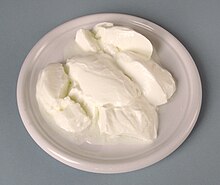Yogurt
Yogurt, or yoghurt is a milk product made by bacterial fermentation of milk. The lactose in the milk becomes lactic acid when it is fermented. Lactic acid acts on the protein in the milk to make yoghurt thick and sour. The milk is heated to about 80 °C to kill any bacteria present, and to change the milk proteins so that they set together instead of becoming curd. After it is cooled to about 45 °C, the bacteria culture is added, and the milk is kept at that temperature for 4 to 7 hours to ferment. Yogurt can also be made from plant milks such as almond milk, soy milk, and coconut milk.
| Nutritional value per 100 g (3.5 oz) | |
|---|---|
| Energy | 257 kJ (61 kcal) |
| Carbohydrates | 4.7 g |
| - Sugars | 4.7 g (*) |
| Fat | 3.3 g |
| - saturated | 2.1 g |
| - monounsaturated | 0.9 g |
| Protein | 3.5 g |
| Vitamin A equiv. | 27 μg (3%) |
| Riboflavin (Vit. B2) | 0.14 mg (9%) |
| Calcium | 121 mg (12%) |
| (*) Lactose content diminishes during storage. Percentages are relative to US recommendations for adults. Source: USDA Nutrient database | |

Yogurt is one of the oldest produced foods in human history. No one knows for sure how long yogurt has been around. Today, it is eaten all over the world. It is rich in protein, calcium, riboflavin, vitamin B6 and vitamin B12.
Spelling
changeYogurt derives romfrom the Turkish word yoğurt and in English, the word can be spelled either 'yogurt' or 'yoghurt'. In Canada 'yogourt' is also common.[1] It can be spoken with either a short or a long 'o'.
History
changeThe earliest yogurts were probably made by wild bacteria (yeast infections) and happened by chance.[2]
The oldest writings mentioning yogurt were by Pliny the Elder, who said that some people knew how to thicken the milk into something which was sour but tasty.[3]
Stamen Grigorov (1878–1945), a Bulgarian student of medicine in Geneva, first examined the bacteria in Bulgarian yogurt. In 1905 he said that it contained a round and a rod-like lactic acid-producing bacteria. In 1907 the rod-like bacteria was called Lactobacillus bulgaricus (now Lactobacillus delbrueckii subsp. bulgaricus). The Russian Nobel laureate biologist Ilya Ilyich Mechnikov, from the Pasteur Institute in Paris, was influenced by Grigorov's work and made a hypothesis that eating yoghurt regularly was the reason why Bulgarian peasants lived for so long. Mechnikov believed that Lactobacillus was needed for good health, and worked to make yoghurt popular through Europe.
Nutrition
changeYoghurt has a lot of protein, calcium, riboflavin, vitamin B6 and vitamin B12 in it.[4] It is healthier than milk is. Many people who are lactose-intolerant can enjoy yoghurt, because much of the lactose in the milk has been changed into lactic acid.[5]
Yoghurt also has medical uses,[6] such as preventing antibiotic-associated diarrhea.[7][8][9]
References
change- ↑ Pope, John (1 April 2015). "Yogurt, yoghurt, yogourt, or ?". porkandgin. Retrieved 13 February 2017.[permanent dead link]
- ↑ Grigoroff, Stamen Étude sur une lait fermenté comestible. Le “Kissélo mléko” de Bulgarie. Revue Médicale de la Suisse Romande. Genéve. Georg&G., Libraires-Éditeurs. Librairie de L’Université. 1905
- ↑ The Natural History of Pliny, tr. John Bostock and H.T. Riley, London: Bell, 1856-93, Volume 3, p. 84: "It is a remarkable circumstance, that the barbarous nations which subsist on milk have been for so many ages either ignorant of the merits of cheese, or else have totally disregarded it; and yet they understand how to thicken milk and form there from an acrid kind of milk with a pleasant flavour".
- ↑ "Yale-New Haven Hospital nutrition advisor - Understanding yogurt". Archived from the original on 2008-10-06. Retrieved 2010-05-08.
- ↑ "Yogurt--an autodigesting source of lactose. J.C. Kolars et al., New England Journal of Medicine, 310:1-3 (1984)". Archived from the original on 2010-04-29. Retrieved 2010-05-08.
- ↑ O. Adolfsson et al., "Yogurt and gut function", American Journal of Clinical Nutrition 80:2:245-256 (2004) [1]
- ↑ Ripudaman S. Beniwal, et al., "A Randomized Trial of Yogurt for Prevention of Antibiotic-Associated Diarrhea", Digestive Diseases and Sciences 48:10:2077-2082 (October, 2003) doi:10.1023/A:1026155328638
- ↑ "Yogurt Good for Gums, Health Archived 2009-08-30 at the Wayback Machine", dentalblogs.com (February 26, 2008)
- ↑ Dairy augmentation of total and central fat loss in obese subjects